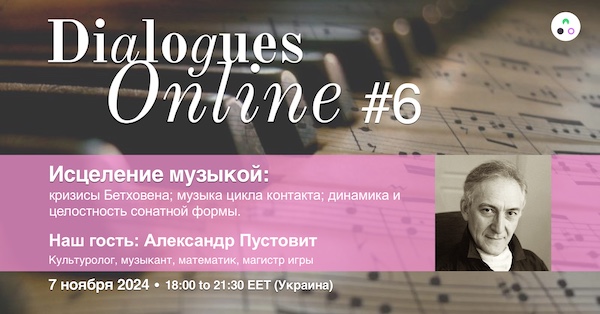
Participants:
- Alexander Pustovit is a Ukrainian cultural critic, musician, and lecturer. Candidate of Physical and Mathematical Sciences. Author of textbooks: “History of European Culture. Introduction to Cultural Studies”, “Ethics and Aesthetics. Heritage of the West. History of Beauty and Goodness”, “Introduction to Logic”.
- Olga Kadysheva, psychologist, crisis psychologist, Gestalt therapist, leading trainer of NAGTU “Ukrainian Gestalt Institute”. Ukraine – France
- Mikhail Slutskin, psychologist, accredited Gestalt therapist and supervisor of NAGTU “Ukrainian Gestalt Institute”, leading supervisory and therapeutic groups. Ukraine – Germany
- Mikhail Baytalsky, philosopher, PhD, Gestalt therapist of HIGiP (Kharkov Institute of Gestalt and Psychodrama). Ukraine – USA
Topic:
We’re going to talk about healing with music:
- Beethoven’s crises;
- the music of the cycle of contact ;
- the dynamics and integrity of sonata form.
When: November 7, 2024 p.
Meeting duration: 3.5 hours, from 18:00 to 21:30 (Kyiv time).
Plan of the event:
Introduction: 5 minutes.
Speakers’ dialog: 1 hour.
Question on the topic: 15 minutes.
Break: 15 minutes.
Discussion in working groups: 55 minutes.
Questions and exchange of opinions in a common group: 1 hour.
Что такое Диалоги Онлайн?
Dialogues Online is a space for collaborative reflection on what matters most in the face of the ongoing crisis. Dialogues Online is a continuation of the “Dialogues in Toulouse” held in May 2023 as part of a school for Gestalt therapists for intercultural exchanges of experience.
For whom:
▪️ For practicing psychologists with a Gestalt approach and other areas of psychology and psychotherapy.
▪️ For students in relevant programs.
▪️ For anyone interested in psychology and philosophy.
▪️ For those seeking themselves and their place in a changing world, for those who are curious, sensitive, changing themselves, open to new experiences and resources.
For: Education in psychology, philosophy and anthropology; developing a culture of dialog.
How: by creating a collegial interdisciplinary field for reflection in dialog and polylogue.